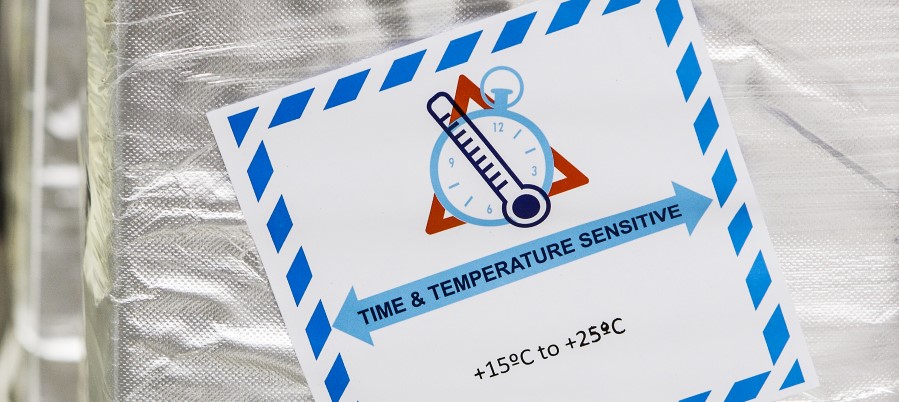🕒 Article read time: 4 minutes
COVID-19 vaccine rollout: a logistics success story

The supply chain continuity provided by the air cargo industry has been one of the most important assets in the world’s fight against the COVID-19 pandemic.
At first, the sector stepped up to deliver many of the medicines, PPE, and other vital products the nation desperately needed, and now, one year on, air freight operators have been instrumental in enabling the administration of 425,019,505 doses of coronavirus vaccines across the globe.
More than 30 million people in the UK have now received a COVID-19 vaccine, testament to the incredible collaborative work of many industries, including, of course, the input of the logistics sector. The logistics industry had to overcome vast obstacles to reach this point – relating to security, storage, personnel, and capacity. As the vaccine rollout programme continues around the globe, those challenges remain.
COLD CHAIN CHALLENGES
In addition to the huge volumes of product involved – the equivalent of 8,000 Boeing 747s are needed to ship the vaccines around the world to reach every person to be vaccinated – there are numerous considerations unique to the specific products; the individuals involved in their distribution needed to understand the complexities of transporting each different type of vaccine and cater accordingly. The Oxford-AstraZeneca vaccine must be stored at ‘fridge temperature’ (2-8°C), whereas the Pfizer vaccine must be stored at around -70°C for it to be effective – making it much more challenging to transport. In response, Pfizer worked with Softbox, a specialist packaging manufacturer, to develop a temperature-controlled, reusable parcel shipper specifically for ultra-low temperature shipments.
The vaccines must be stored effectively in temperature-controlled facilities when not in transit – facilities which needed to be constructed to cope with both the huge volumes and unique storage requirements. UPS is one of the companies which rose to the challenge, constructing two ‘freezer farms’ in the Netherlands and the USA, which store a total of 600 deep-freezers, each capable of holding 48,000 vials of vaccine at temperatures as low as -80C.
PROTECTING PRECIOUS GOODS
Some individual vaccine shipments are valued as high as $70 million, according to Bloomberg sources, with the Transported Asset Protection Association – an industry group representing companies that carry precious goods – describing vaccine distribution as “the biggest security challenge in a generation.” In December 2020, INTERPOL issued a global alert to law enforcement across its 194 member countries warning them to prepare for organised crime networks targeting COVID-19 vaccines, both physically and online, with a warning that groups are planning to infiltrate or disrupt supply chains.
Businesses had to move quickly to train staff in the complex security, handling and monitoring requirements involved, and ensure shipment security was watertight, with all systems able to cope with the requirements of transporting such a high volume of valuable commodities. Security systems are only as strong as their weakest link, so all those within the supply chain – from manufacturers, scientists, nurses to drivers – needed to prepare accordingly. For example, many HGV drivers undertook specialist training on how to handle an attack on vaccine cargo, with trucks having specialist alterations and some shipments even requiring armed guards in places.
THE CHALLENGES GOING FORWARD
The restrictions placed on passenger travel following the COVID-19 outbreak – coupled with the economic downturn – have posed a constant challenge to the ability of the air cargo industry to operate effectively and will continue to do so until passenger flight levels return to something approaching normality. Overall capacity for air cargo has now shrunk by 25% compared to 2019 levels. While we have seen an increase in cargo-only movements since March 2020, it is worth noting that pre-pandemic, belly hold cargo (goods transported via passenger aircraft) at Heathrow Airport accounted for more than 60% of total UK air freight volume; this figure has shrunk in line with the reduction in air passenger volume and subsequent loss in available capacity.
Until passenger flight levels resume, an expansion in available slots for dedicated freight flights would help to bridge the trade gap. In the meantime, priority must be given to vaccine shipments, with ample slot flexibility and fleet availability. In the UK, any border arrangements with EU neighbouring states must prioritise the movement of vaccines to prevent delays. Businesses operating in the logistics industry have the expertise and dedication required to transport the vaccines safely and swiftly, but they do need the right support from government and other stakeholders.
“The distribution of the vaccines has been another success story for the logistics sector,” said Zoe McLernon, Logistics UK’s Multimodal Policy Manager, “The industry has shown its resilience, agility and strength throughout the pandemic. And, while political disagreements between the UK and EU on vaccine supplies carry on, the logistics sector is always ready to adapt to continue delivering for the global population.”
*www.logistics.org.uk/air
Published On: 01/04/2021 14:00:24

Comments Section
If you are a Logistics UK member login to add comments.